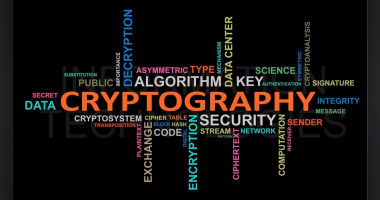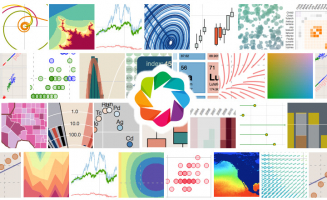Top 10 Best Online Database Courses
If you want to be able to alter and control data to fit the needs of your organization, you'll need to learn some great database administration abilities. ... read more...However, because there are so many database platforms and tools available, it can be difficult to know where to begin. So, here is a list of the top ten Best Online Database Courses that will teach you the best database management skills. You'll be able to manage incoming data, organize it, and provide ways for other users to extract and modify it using these techniques.
-
This course will not teach you SQL or programming languages, but it will teach you skillsets and patterns for database engineering. Indexing, Partitioning, Sharding, Replication, b-trees in-depth indexing, Concurrency management, database engines and security, and much more will be covered. They believe that learning the fundamentals of database engineering will provide you with the tools you need to tackle difficult and difficult problems on your own.
They always equate engineering to math, but you never learn specific formulae and equations; you just know how to prove, derive, and solve any equation that comes your way. Database engineering is comparable; you can't argue MongoDB is superior than MySQL or Postgres is superior to Oracle. Instead, you learn your use case and then make optimal judgments by learning how each database platform handles its particular trade-offs.
Another thing you will study in this course is the database engine, which is the lowest database interface that communicates with the operating system. Database engines, also known as storage engines or embedded databases, are software libraries that are used by database management software to store data on disk and perform CRUD operations (create update delete) Embedded means putting everything in one software and eliminating the need for a client-server network. In this video course, they'll go over a few popular database engines, explain the differences between them, and then spin up a database, change its engine, and demonstrate the various features of each engine.
What you will learn:- Learn and understand ACID Properties
- Database Indexing
- Database Partitioning
- Database Replication
- Database Sharding
- Database Cursors
- Concurrency Control (Optimistic, Pessimistic)
- B-Trees in Production Database Systems
- Database System Designs
- Difference between Database Management System, Database Engine and Embedded database
- Database Engines such as MyISAM, InnoDB, RocksDB, LevelDB and More
- Benefits of Using one database engine over the other
- Switching Database Engines with MySQL
- Database Security
- Homomorphic Encryption
Udemy rating: 4.7/5.0
Enroll here: udemy.com/course/database-engines-crash-course/
careers360.com 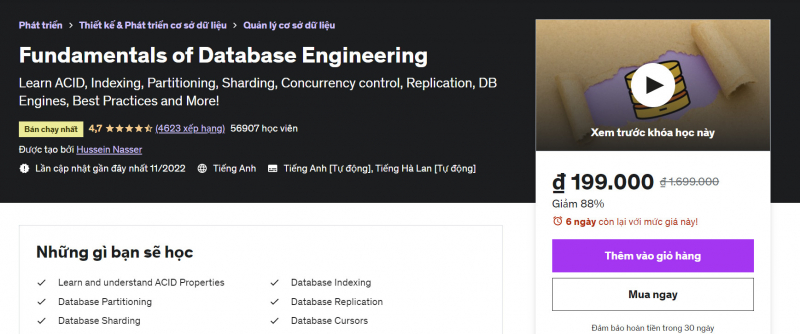
udemy.com -
Fundamentals of Data Engineering Specialization ranks 2nd in the list of the best online Database courses. You'll develop your understanding of data engineering, gain skills that can be applied directly to a data career, and build the foundation of your data engineering career. Upon successfully completing these courses, you will have the practical knowledge and experience to delve deeper into data engineering and work on more advanced data engineering projects. Data engineering is one of the fastest-growing IT careers, with a severe shortage of skilled data engineers. Data engineering's purpose is to make high-quality data available for fact-finding and data-driven decision making. This IBM Specialization will assist anyone interested in pursuing a career in data engineering by offering the core skills required to get started. This Specialization does not require any prior data engineering experience.
The Specialization comprises of five self-paced online courses that address data engineering skills such as the data engineering ecosystem and lifecycle, Python, SQL, and Relational Databases. These data engineering prerequisites will be taught to you through entertaining videos and hands-on practice with real tools and databases.What you will learn:
- Working knowledge of Data Engineering Ecosystem and Lifecycle. Viewpoints and tips from Data professionals on starting a career in this domain.
- Python programming basics including data structures, logic, working with files, invoking APIs, using libraries such as Pandas and Numpy, doing ETL.
- Relational Database fundamentals including Database Design, Creating Schemas, Tables, Constraints, and working with MySQL, PostgreSQL & IBM Db2.
- SQL query language, SELECT, INSERT, UPDATE, DELETE statements, database functions, stored procs, working with multiple tables, JOINs, & transactions.
Coursera: 4.7/5.0
Enroll here: coursera.org/specializations/data-engineering-foundations
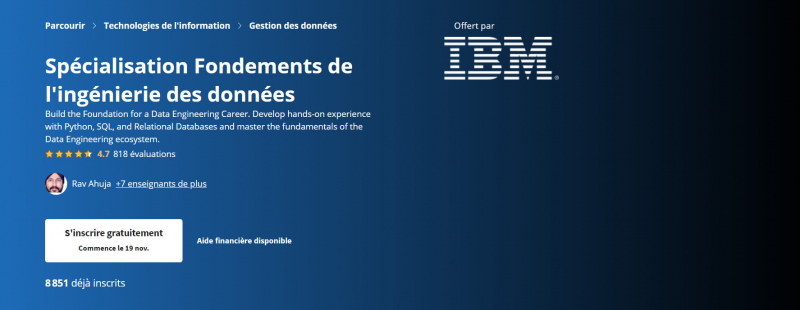
coursera.org 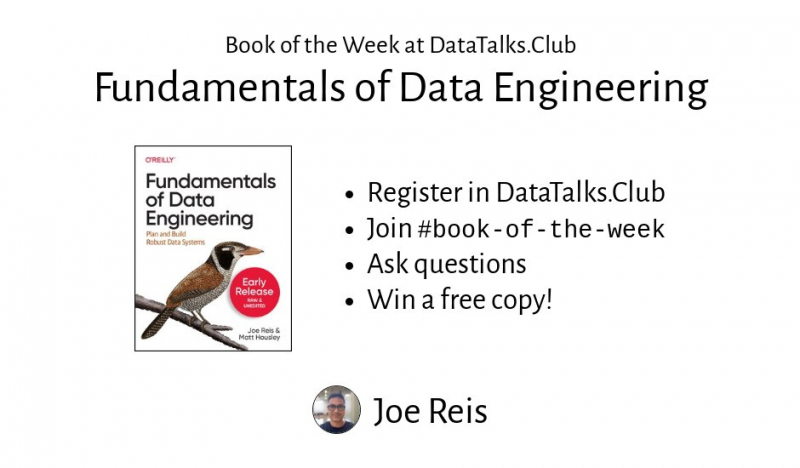
coursera.org -
This specialization is for you if you are a beginning programmer with an interest in Data Science, a data scientist working closely with content experts, or a software developer looking to learn about the database layer of the stack. They concentrate on relational databases, which are the most common type of database. Relational databases have dominated the database software market for nearly four decades and are an essential, foundational component of software development.
This specialization will teach you about database architecture, database software principles, and how to work with databases using the Structured Query Language (SQL). The specialization will culminate with a look at future database trends, such as non-relational databases (NoSQL) and Big Data. After completing this specialization, you will be well prepared to design and build efficient and effective relational databases, populate them with data, and interact with them using SQL.
In Relational Database Design and The Structured Query Language (SQL), you will code, reflect on what you learned, and describe the difficulties you encountered. Then, in Advanced Topics and Future Trends in Database Technologies, you will plan a big data project and investigate the advantages and disadvantages of non-relational databases.
What you will learn:- Design effective, efficient databases through normalization and data modeling
- Develop expertise in programming with the Structured Query Language (“SQL”)
- Knowledge about database operations, data warehouse, big data, and NoSQL
- Create Entity Relationship Models and Entity Relationship Diagrams
Coursera rating: 4.7/5.0
Enroll here: coursera.org/specializations/databases-for-data-scientists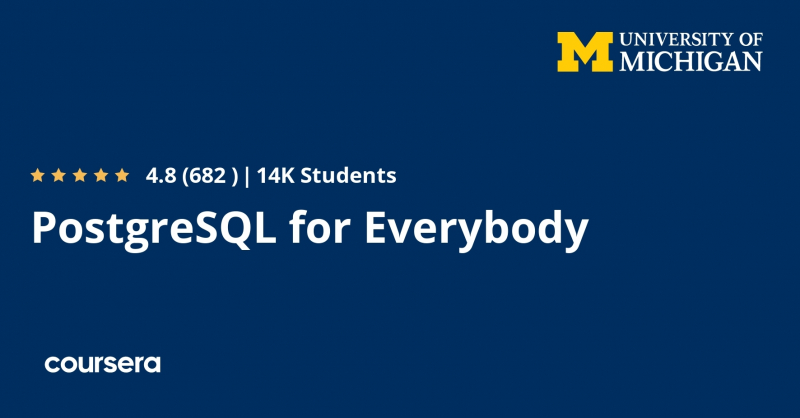
coursera.org 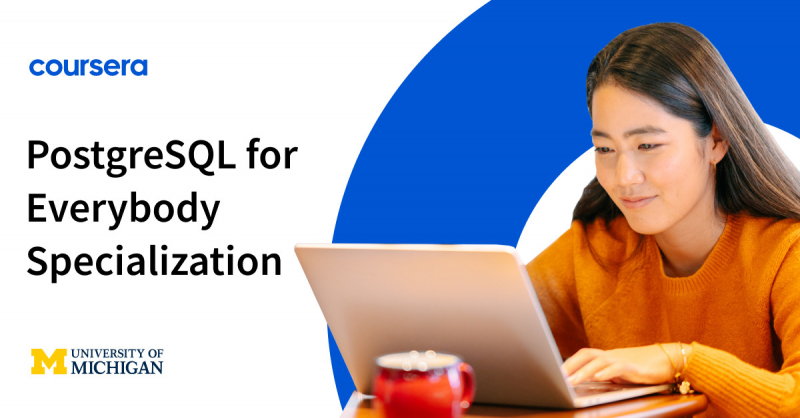
coursera.org -
This specialty is for you if you are a beginning programmer with an interest in Data Science, a data scientist working closely with content experts, or a software developer looking to learn about the database layer of the stack. They concentrate on relational databases, which are the most common type of database. Relational databases have dominated the database software market for nearly four decades and are an essential, foundational component of software development.
This specialization will teach you about database architecture, database software principles, and how to work with databases using the Structured Query Language (SQL). The specialization will culminate with a look at future database trends, such as non-relational databases (NoSQL) and Big Data. After completing this specialization, you will be well prepared to design and build efficient and effective relational databases, populate them with data, and interact with them using SQL.
In Relational Database Design and The Structured Query Language (SQL), you will code, reflect on what you learned, and describe the difficulties you encountered. Then, in Advanced Topics and Future Trends in Database Technologies, you will plan a big data project and investigate the advantages and disadvantages of non-relational databases.
What you will learn:
- Design effective, efficient databases through normalization and data modeling
- Develop expertise in programming with the Structured Query Language (“SQL”)
- Knowledge about database operations, data warehouse, big data, and NoSQL
- Create Entity Relationship Models and Entity Relationship Diagrams
Coursera rating: 4.7/5.0
Enroll here: coursera.org/specializations/databases-for-data-scientists
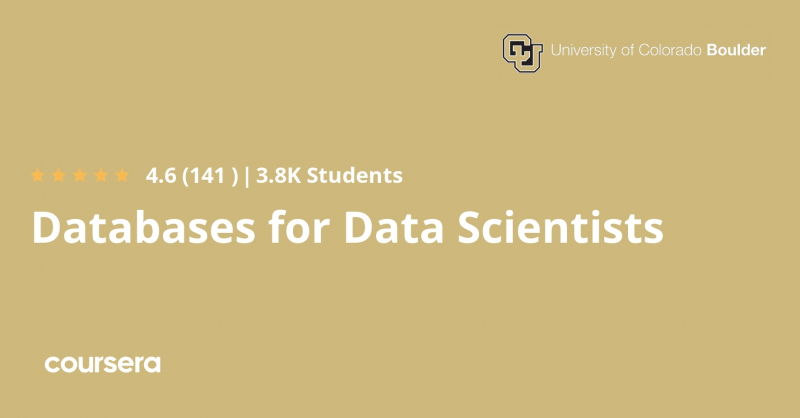
coursera.org 
internsoft.com -
Want to get started in the world of database engineering? This program is taught by recognized industry experts at Meta. You'll learn the key skills needed to create, manage, and manipulate databases, as well as industry-standard programming languages and software such as SQL, Python, and Django used to power websites. and featured apps like Facebook, Instagram, etc.
Upon completion, you'll have access to the Meta Career Programs Job Board—a job search platform that connects you with over 200 employers committed to finding talent through certification programs of Meta, as well as career resources to help you get your job done with Search. Any third-party trademarks and other intellectual property (including logos and symbols) referenced in the learning experience remain the property of their respective owners. Unless specifically identified as such, Coursera's use of third-party intellectual property does not indicate any relationship, sponsorship or endorsement between Coursera and the owners of these trademarks or resources. other intellectual property.
You will complete a series of 5 projects in which you will demonstrate your proficiency in different aspects of database engineering. You will demonstrate your skills with database normalization by structuring your own relational database by defining relationships between entities and developing relational schemas. This is followed by a stored procedure project in which you will demonstrate your prowess in SQL automation by writing a stored procedure to solve real-world problems. After developing your skills in Python, you will create a Python application to administer the MySQL database and program its interactions with clients.
In your next project, you are asked to apply data modeling to a real-world project by implementing advanced data modeling concepts such as automation, storage, and optimization. Finally, you will be tasked with creating a MySQL database solution for an application by building on the knowledge and skills they have gained throughout the program.
What you will learn:
- Core techniques and methods for structuring and managing databases.
- Advanced techniques for writing database driven applications and advanced data modeling concepts.
- MySQL database management system (DBMS) and data creation, querying, and manipulation.
- How to Code and Use Python Syntax
- How to prepare for technical interviews for a database engineer role.
Coursera rating: 4.6/5.0
Enroll here: coursera.org/professional-certificates/meta-database-engineer
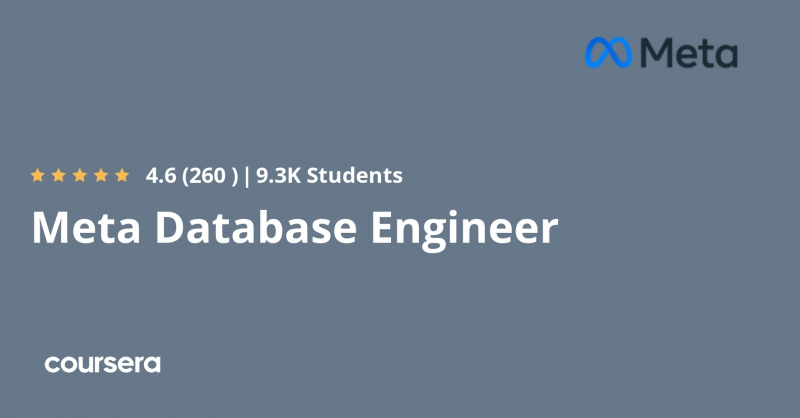
coursera.org -
Mastering the fundamentals of Database Management System is critical for getting started with Computer Science since Database Management System is the program that is responsible for the convenience with which they can get data from the database, which is the backbone of the internet today. The ideas they will study will provide a thorough understanding of Database Management System, and by the end of it, you will be able to answer any Database Management System interview question.
It is quite difficult to interface with the data on the server without the use of Database Management Systems. Database Management Systems are now implemented on all servers. This course will not only teach you the fundamentals of database management systems, but it will also prepare you to explore advanced concepts in database management systems.
Every idea of Database Management System is taught in this course in an easy-to-understand manner, so that anyone without any prerequisites can master the concepts of Database Management System in the simplest way possible. Come join me; I guarantee you will have the best learning experience not only of Database Management Systems but also of the core of Computer Science in a different dimension.
What you will learn:- You will become very familiar with the core concepts of Database Management Systems
- You will be able to challenge the interviewer on questions related to Database Management Systems
- You will view Computer Science in a different dimension
- You will be able to answer all questions of these topics in exams like GATE,PGEE,ISRO
- You will be able to get a top grade in your Database Management Systems course in your Bachelor's degree
- Understand how Database Management Systems work
Udemy rating: 4.5/5.0
Enroll here: udemy.com/course/database-management-system-course/
downloadly.ir -
Data Integration Fundamentals ranks 7th in the list of the best online Database courses. It is obvious that you live in a data-driven world. As you continue to live increasingly digitized lives, data is becoming a valuable asset in the modern economy. They generate valuable data when you go online to make purchases, view content, or share on social media. Many of the world's largest IT companies are now based on data-driven business strategies. None of this, however, is possible without data integration. Data integration is the glue that allows raw data to be transformed into a valuable asset.
They will concentrate on three types of data integration in this course: business-to-business integration, application integration, and database integration. You'll discover how organizations share data using industry-standard EDI, XML, and APIs. They'll go through typical communication techniques such as FTP and AS2. You'll also learn about application integration methods like as SOAP, REST APIs, and Webhooks. And they'll show you how to employ database integration technologies such as data warehouses, data lakes, streaming data, extract-transform-load processing, and data propagation strategies such as replication.
By the end of the course, you will have a firm grasp of how data integration may be utilized to improve business outcomes. You will understand how these strategies are used and will be able to effectively discuss data integration projects with software providers, clients, suppliers, or your own IT staff.
What you will learn:- Data integration basics - What is data integration and why it's important in the modern business environment
- How data integration skills can create more success in your non-technical career
- Why data integration is a great way to transition into a technology career
- Learn common approaches to Business-to-Business (B2B) integration including EDI, XML, JSON, Text files, FTP and AS2.
- Gain a detailed understanding of Application Integration technologies including HTTP, SOAP, REST APIs, and Webhooks.
- Learn about Database Integration techniques like data warehousing, data lakes Extract-Transform-Load (ETL), and replication.
Udemy rating: 4.5/5.0
Enroll here: udemy.com/course/data-integration-fundamentals/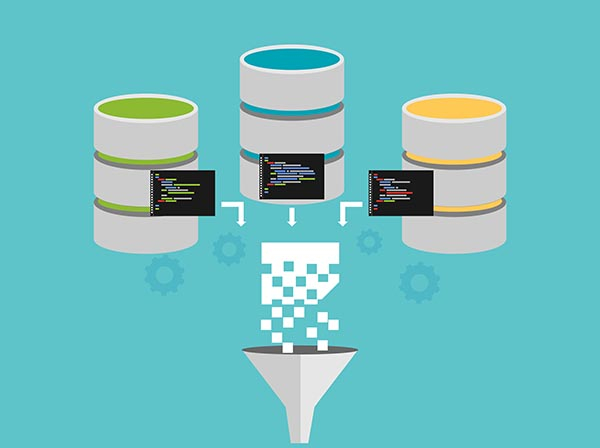
educba.com 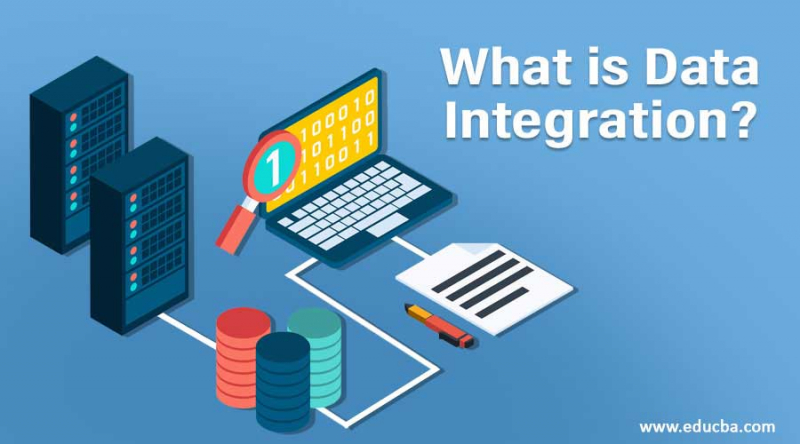
educba.com -
Mastering the fundamentals of Database Management System is critical for getting started with Computer Science since Database Management System is the program that is responsible for the convenience with which you can get data from the database, which is the backbone of the internet today. The ideas you will study will provide a thorough understanding of Database Management System, and by the end of it, you will be able to answer any Database Management System interview question.
It is quite difficult to interface with the data on the server without the use of Database Management Systems. Database Management Systems are now implemented on all servers. This course will not only teach you the fundamentals of database management systems, but it will also prepare you to explore advanced concepts in database management systems.
Every concept of Database Management System is taught in this course in an easy-to-understand manner, so that anyone without any prerequisites can master the concepts of Database Management System in the simplest way possible. Come join me; they guarantee you will have the best learning experience not only of Database Management Systems but also of the core of Computer Science in a different dimension.
What you will learn:- You will become very familiar with the core concepts of Database Management Systems
- You will be able to challenge the interviewer on questions related to Database Management Systems
- You will view Computer Science in a different dimension
- You will be able to answer all questions of exams like GATE,PGEE,ISRO
- You will be able to get a top grade in your Database Management Systems course in your Bachelor's degree
- Understand how Database Management Systems work
Udemy rating: 4.5/5.0
Enroll here: udemy.com/course/database-management-systems/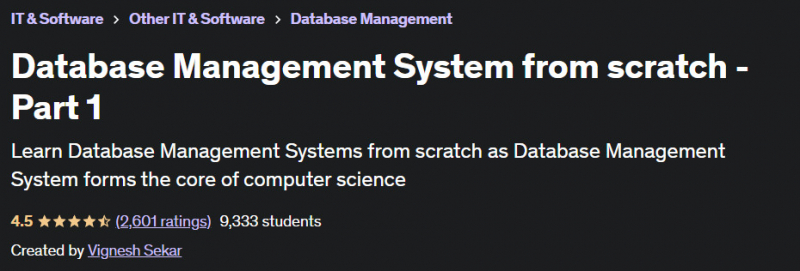
springboard.com -
Learn some of the skills that Microsoft wants you to know in this course, add another tool to your CV or resume, and even pursue official Microsoft certification. SQL Server is one of the most commonly demanded database technologies in the job market, and being able to do DBA for SQL Server could be quite valuable for your current employment and your next job search. They will download and install SQL Server Developer for free, which provides you with all of the functionality of the full-priced Enterprise edition (though without being able to use it for commercial purposes). Let's begin by downloading a demonstration database and learning how to backup and restore it, as well as what recovery models are applicable for other databases, so that you can provide Point in Time recovery.
The course will take around 10 hours to complete, but completing this will enable you to versed in Database Administration tasks, giving you hands-on experience. They will manage logins and server roles, allowing you to regulate who has access to what data, as well as design and maintain indexes to speed up searches and import and export data. They'll look at SQL Server Agent management so you can automate normal operations and be alerted to problems, they'll look at database management and configuration, and they'll look at compression, both of which help with managing large databases. And a lot more.
The course gradually rises in difficulty, so you'll manually backup a database before using SQL Server Agent to automate it. They will only conduct things in this course that require a single computer, rather than numerous servers or virtualization. The course is fairly relaxed - there will be a few "wrong turns" to show you what problems could develop, but each session works towards an end goal at a relatively modest speed, so you can easily follow along on your own computer. They'll assuming you know how to operate a computer, including how to install programs, but the actual DBA will be basic, and they'll present each component as they go.
There is no need for T-SQL experience because they will demonstrate everything they can using the GUI (Graphical User Interface) as well as T-SQL. However, if you intend to take the official Microsoft test, you must have the equivalent understanding as described in my first two courses on 70-461 T-SQL. You can download a certificate of completion at the end of the course to show off your new skills and continue your preparations for official Microsoft certifications. The course was recorded on SQL Server 2017, but it will also work in 2022, 2019, 2016, 2014, and 2012, as well as a portion of 2008R2 and 2008.
What you will learn:
- Create Backups and Restore Databases, understanding the different recovery models
- Manage logins and server roles, and import and export data
- Implement and maintain indexes, and manage and configure databases, including compression and concurrency problems
- Manage SQL Server Agent and audit SQL Server instances
- Collect and analyse troubleshooting data
- Plan and install SQL Server and related services, including implementing a migration strategy
Udemy rating: 4.5/5.0
Enroll here: udemy.com/course/70-462-sql-server-database-administration-dba/
careers360.com 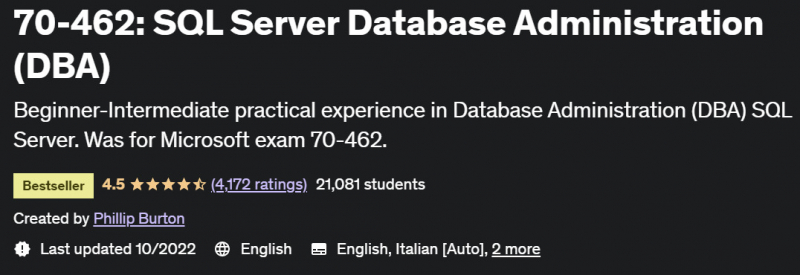
Udemy.com -
Data management is one of the most crucial skills your firm possesses. With Digital Transformation at the top of many big businesses' strategic agendas, Data Governance and Data Management are critical to laying a solid basis for integration, analysis, execution, and total business value. The convergence of megatrends centered on Customer 360, Artificial Intelligence, Big Data, programmatic marketing, and globalization is currently confronting business and data professionals. To survive these relentless corporate pressures, it's more important than ever to put your data to work!
This course will teach you about the major data management disciplines. You will first learn what Data Governance is and why you might want to build one for your organization, followed by some very basic exploratory Data Analysis using the Python programming language.
Following that, you'll learn the principles of Database Design, Data Quality, and the Structured Query Language. Then you'll get your hands dirty with some basic Data Integration ETL as well as Big Data using Hadoop. Finally, you will investigate the various disciplines within the Data Management domain. You will have a solid understanding of enterprise data management and what the various disciplines do by the end of the course.
What you will learn:- Get started working with data
- Understand big data fundamentals
- Explore tabular data with Python
- Learn the fundamentals of SQL
- Use the ETL workflow for data integration
Udemy rating: 4.4/5.0
Enroll here: udemy.com/course/getting-started-with-data-management/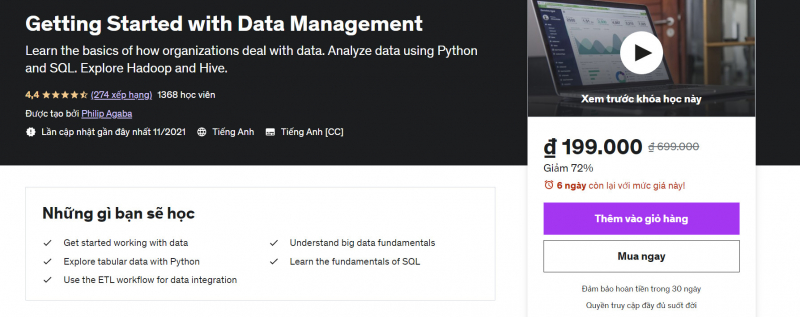
udemy.com 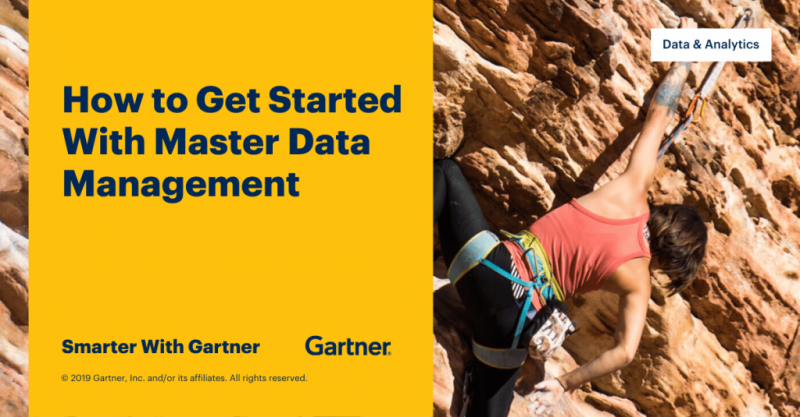
gartner.com















